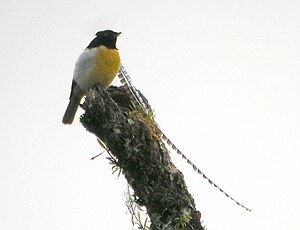King of Saxony bird-of-paradise
| King of Saxony bird-of-paradise | |
|---|---|
 |
|
| Male in Papua New Guinea | |
| Scientific classification | |
| Kingdom: | Animalia |
| Phylum: | Chordata |
| Class: | Aves |
| Order: | Passeriformes |
| Family: | Paradisaeidae |
| Genus: |
Pteridophora A.B. Meyer, 1894 |
| Species: | P. alberti |
| Binomial name | |
|
Pteridophora alberti Meyer, 1894 |
|
| Subspecies | |
|
P. a. alberti |
|
P. a. alberti
P. a. buergersi
P. a. hallstromi
The King of Saxony bird-of-paradise (Pteridophora alberti) is a bird in the bird-of-paradise family (Paradisaeidae). It is the only member in the monotypic genus Pteridophora. It is endemic to montane forest in New Guinea.
Adolf Bernard Meyer of the Dresden Museum described this species in the December 1894 bulletin of the British Ornithologist's Club. Both the common name "King of Saxony" and the scientific specific name "alberti" were given to honour to the then king of Saxony, Albert of Saxony, whose wife gave her name to the Queen Carola's parotia.
The bird is sometimes referred to as "Kiss-a-ba" by the natives of Papua New Guinea and Western New Guinea, as a human interpretation of the male's loud call.
The adult King of Saxony bird-of-paradise is approximately 22 cm long. The male is black and yellow with a dark brown iris, brownish-grey legs, a black bill with a bright aqua-green gape, and two remarkably long (up to 50 cm) scalloped, enamel-blue brow-plumes that can be independently erected at the bird's will. The unadorned female is greyish brown with barred underparts.
The male's ornamental head plumes are so bizarre that, when the first specimen was brought to Europe, it was thought to be a fake.
The King of Saxony bird-of-paradise inhabits the montane forests of New Guinea, and is distributed from the Weyland Mountains in Western New Guinea to the Kratke Range in Papua New Guinea between 1,300–2,850 meters above mean sea level, but usually between 1,800–2,500 meters above sea level.
...
Wikipedia

